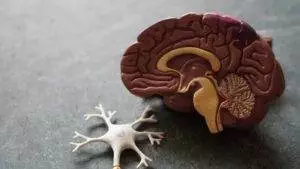-
 Art of Wellness Acupuncture & Traditional Chinese Medicine (TCM)11704 Wilshire Blvd, Suite 295, Los Angeles, CA, 90025
Art of Wellness Acupuncture & Traditional Chinese Medicine (TCM)11704 Wilshire Blvd, Suite 295, Los Angeles, CA, 90025
myartofwellness@gmail.com310-451-5522 Office Hours
MonClosedTue7:30 am --4 pmWed7:30 am --4 pmThu7:30 am -- 4 pmFri7:30 am -- 4 pmSat7:30 am -- 4 pmSunClosedOur office opens from Tuesdays to Saturdays 7:30 am to 4 pm, will be closed on Memorial day, Independent day, Labor day, Thanksgiving day, Christmas and New year.
-
Recent Posts
- Chinese New Year 2026: Year of the Horse
- Acupuncture and TCM Treatment for Perimenopause Symptoms
- How to Treat Insulin Resistance With Acupuncture and TCM
- How to Treat Metabolic Syndrome With Acupuncture and TCM
- How to Treat Syncope With Acupuncture and TCM
- How to Treat Thoracic Outlet Syndrome With Acupuncture and TCM
- How to Treat Dupuytren’s Contracture With Acupuncture and TCM
- How to Treat Nutcracker Syndrome With Acupuncture and TCM
- How to Treat Rosacea With Acupuncture and TCM
- How to Treat Perioral Dermatitis With Acupuncture and TCM
- Lymphatic Drainage With Acupuncture and TCM
- How to Treat Turf Toe With Acupuncture
- How to Treat Nerve Pain With Acupuncture and TCM
- How to Treat Watery Eyes With Acupuncture and TCM
- How to Treat Ovarian Cysts With Acupuncture and TCM
- How to Treat Dystonia With Acupuncture and TCM
- Sign up to receive news and updates and get my free report:“The Top 10 Reasons to Try Acupuncture”

November 2025 M T W T F S S 1 2 3 4 5 6 7 8 9 10 11 12 13 14 15 16 17 18 19 20 21 22 23 24 25 26 27 28 29 30
Wellness
How to Quit Smoking With Acupuncture and TCM
By Xiaomei Cai, L.Ac., Ph.D. & Qineng Tan, L.Ac., Ph.D.
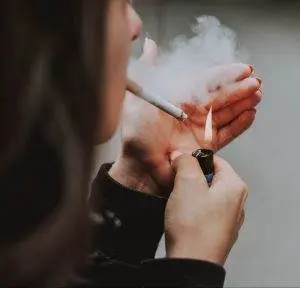
Have you been trying to stop smoking, but are having a hard time quitting? You know that quitting smoking will definitely improve your overall health and longevity, but that doesn’t mean it’s easy to do. Acupuncture treatment can reduce cravings, alleviate withdrawal symptoms of nicotine, and help relieve anxiety you feel when you stop smoking.
Smoking tobacco causes several million unnecessary deaths every year, and is associated with multiple chronic diseases, including lung disease, cardiovascular disease, diabetes, lung cancer and other types of cancer. But deaths related to smoking are just the tip of the iceberg. According to the CDC, over 16 million Americans are currently living with a chronic disease caused, at least in part, by smoking. Smoking increases the risk of stroke, erectile dysfunction in men (ED), low sperm count, and autoimmune diseases such as rheumatoid arthritis. On average, smoking takes ten years off a person’s life.
Why do we keep doing this to ourselves? Because once you have a smoking habit, quitting smoking is very hard. Tobacco contains a natural chemical called nicotine. Nicotine is a highly addictive substance. It acts upon the neurotransmitters in the brain that release dopamine: the “feel-good” chemical. When you inhale tobacco smoke, nicotine goes directly to your brain, and you get an immediate “reward” in the form of dopamine. Once your brain gets used to this reaction, it wants more of it. Even when you know you should stop smoking, and you want to quit, a part of your brain is signalling you not to stop.
Vaping, or smoking from a vape pen, or e-cigarette, is the latest trend. There has been some suggestion that this form of smoking causes less damage than cigarettes do, because Juul pens don’t have many of the toxic additives that are in regular cigarettes. So far, researchers don’t know how long-term vape use will affect people’s overall health. However, it is clear that people who vape can easily become just as addicted to nicotine as smokers of cigarettes, cigars, and pipes do.
Once the brain has become attuned to the dopamine reaction caused by nicotine, a very powerful social-emotional component is added to the physical, chemical component. Being in a place where you have smoked in the past, seeing a friend who smokes, smelling smoke in the air, and of course, seeing an ad for cigarettes–all these sorts of cues in your daily environment can have a dramatic impact on your desire to smoke.
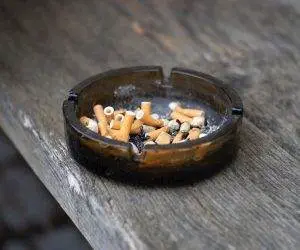
Almost half of all smokers in the U.S. make an attempt to quit smoking each year. But, obviously, people fail in their attempts to stop smoking all the time. Nicotine withdrawal symptoms include intense anxiety. When faced with a powerful combination of physical and emotional stress, most people will return to that quick fix. Even when a person develops serious problems due to smoking, like a constant cough, emphysema, sleep apnea/snoring, infertility, acid reflux/heartburn, loss of smell and taste; even when a person knows that second hand smoking can hurt their loved ones, they still may find it impossible to quit. People need help to quit smoking.
Typical smoking cessation aids include nicotine gum or patches, medications, and programs designed to educate and support people as they try to overcome smoking addiction. While these methods offer help, they do not work for everybody. Most people have to try to quit smoking many times and try different methods before finding success.
Many people gain weight when they quit smoking, because the cravings for a cigarette are replaced by cravings for sweets or other foods and drinks that keep your hands and mouth occupied. It’s more than just an oral habit, though; nicotine affects the way your body uses insulin and releases glucose, so when you quit smoking, there is a very real change in blood sugar levels and a subsequent desire to eat more carbohydrates. When it feels like you have to choose between two different risk factors–being a smoker, or being overweight–,it may seem like a hopeless situation.
TCM for smoking cessation offers a different, multi-pronged approach. With acupuncture treatment for nicotine addiction, we can work on several of the problems smoking causes at the same time. Using acupuncture to stimulate specific pressure points for reducing cravings and alleviating symptoms of smoking withdrawal is only one way that TCM can help people quit smoking and regain good health. Our TCM detox program may also be helpful.
Top 10 Symptoms of Nicotine Withdrawal
When you try quitting smoking “cold turkey,” you will probably feel more severe symptoms of withdrawal for the first few days. Withdrawal symptoms can last for several weeks. Nicotine withdrawal symptoms include:
- Intense cravings for a cigarette that last for 5-10 minutes
- Feelings of anxiety and stress
- Food cravings, weight gain, rise in blood sugar
- Sleep problems, insomnia
- Persistent cough, “smoker’s cough”
- Flu-like symptoms: fever, fatigue, body ache, headache
- High blood pressure, fast heart rate
- Memory problems, difficulty concentrating
- Dizziness
- Constipation, bloated stomach
Medical Approach to Quitting Smoking
Nicotine replacement therapy (NRT) has been the common form of help for nicotine withdrawal for decades. This involves using nicotine patches, nicotine gum, or lozenges, which help people gradually wean themselves off of nicotine by lowering the dose over time. Nicotine patch side effects can include a rapid heart beat, dizziness, headaches, and nausea.
Medications such as Zyban and Chantix are also used to help people quit smoking. Zyban (Bupropion) is also known as Welbutrin, which is used to treat depression. A prescription medication called Varenicline (Chantix) is the newest medical treatment available to help people stop smoking. Varenicline works by blocking the receptors in the brain that react to nicotine to stimulate dopamine production. Varenicline is still fairly new, and researchers do not yet know the long-term effects of taking it. Common Chantix side effects include nausea, insomnia, and headaches; more serious psychiatric reactions, such as depression and suicidal ideation have also been reported. Drug interventions for smoking cessation are more effective when combined with education and counseling.
The most effective methods to help people stop smoking treat both the brain chemistry that is causing nicotine addiction and the emotional symptoms that arise when quitting. TCM methods of acupuncture and herbs are naturally able to help address addiction because they work on the whole person–physically, mentally, and spiritually.
How Can Acupuncture Help You Quit Smoking?

In conventional medical terms, we mostly think of cigarette smoking as being harmful to the lungs, due to smoke inhalation, and the cardiovascular system, due to the well-known fast heartbeat we associate with nicotine use. In TCM, we do consider that smoking weakens the lungs, but this, in turn, causes problems in the other major organ systems of the body. A buildup of heat in the Heart and Stomach can lead to stagnant Liver Qi. These forces are what cause the withdrawal symptoms of anxious feelings, heart palpitations, irritability, food cravings, and poor sleep. With acupuncture and herbs, we work to clear heat and detoxify the lungs and all of the organs.
A specific set of points on the outer ear are often used to help combat the cravings associated with overcoming addictions of all kinds, including nicotine dependence. Often we will send a patient home with small ear seeds fixed to these points so that they can be squeezed and stimulated whenever you feel an urge to smoke. This will also help with food cravings and prevent overeating and weight gain when you quit smoking.
Acupuncture helps to release endorphins, replacing the familiar dopamine hit with a different sense of relaxation. Endorphins promote a sense of wellbeing and relieve pain. Dopamine works on the reward center of the brain, causing a mental and emotional reaction that leads to addiction. Acupuncture treatment works holistically to help relieve emotional pain–symptoms of anxiety and depression–by positively impacting neurochemical activity. Shifting from dopamine dependence to more abundant endorphins and serotonin will help restore restful sleep.
A controlled trial study compared patients who received acupuncture, patients who received acupuncture and education and counseling, and patients who received sham acupuncture to help them quit smoking over a period of four weeks. The percentage rate of patients who had quit smoking after 18-month follow up was highest among those who received acupuncture, and especially highest among those who had acupuncture and counseling.
A study of almost 3000 people who received acupuncture treatment for smoking over an eight week period showed that the treatment helped many people abstain from cigarettes, and helped many more to cut back on how many cigarettes they smoked.
Chinese Medicine Near Me to Stop Smoking in the Great Los Angeles Area
The decision to quit smoking for good can be a life-changing one. But for most people, it’s also one of the most difficult things they will ever do. Cigarettes are addictive, and to stop smoking, you may need professional help. If you’ve already tried NRT and not been able to finally quit, you may want to consider trying the TCM approach. Whether you chain smoke or only vape socially, whether you are quitting smoking because you want to increase your chances of getting pregnant, or you have lung cancer stage 4, it is never too early or too late to stop smoking. Acupuncture for smoking cessation can help you get past the cravings for cigarettes that make it so hard to quit. Acupuncture and herbs can not only help you kick the habit, but can also help you get rid of that cough, brighten your skin, and sleep better. Most of all, you will have made an important choice to prioritize your health and prevent chronic illness from taking hold later in life.
*This article is for education from the perspective of Traditional Chinese Medicine only. The education provided by this article is not approved by FDA to diagnose, prevent, treat and cure human diseases. It should not stop you from consulting with your physician for your medical conditions. Traditional Chinese Medicine is based on Qi, which is an invisible force that usually cannot be observed by modern science. Because science focuses on testing ideas about the natural world with evidence obtained through observation, these aspects of acupuncture can’t be studied by science. Therefore acupuncture and Chinese herbs are often not supported by double-blind, randomized trials, and they are considered alternative medicine therapies in the United States.
How to Treat UTI With Acupuncture and TCM
By Qineng Tan, L.Ac., Ph.D. & Xiaomei Cai, L.Ac., Ph.D.
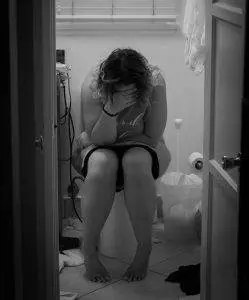
Why do I feel like I have to pee all the time? A urinary tract infection, usually referred to as UTI, is a bacterial infection that affects the bladder and/or other parts of the urinary system, causing urinary urgency, often accompanied by a burning pain when you go to the bathroom. Acupuncture and TCM is a good way to get to the root causes of frequent urination, including recurrent UTIs.
Urinary frequency, or an unusual urgency to urinate, can be caused by several different health conditions. A common cause of bladder pain, pressure on the bladder, or a burning sensation when peeing is a bacterial infection in the urinary tract, or UTI. But there can be many other reasons for constantly feeling like you have to pee, including diabetes, interstitial cystitis (IC), pregnancy, prostate problems, ovarian cysts, and more.
Over half of all adult women have experienced a UTI (also called cystitis) at some point in their lives. Many women get UTIs frequently, making them the most common type of non-hospital-related infection in the U.S. Up to 6% of all doctor visits are related to UTIs. A UTI can occur when bacteria, usually E. coli, gets into the urethra and travels up into the bladder, or further into the urinary tract. This can happen because of hygiene habits, after sex or exercising, or the use of contraceptives or period products. It can also happen when urine sits in the bladder for too long, or because a person has a weakened immune system.
While UTI treatment at home remedies such as drinking cranberry juice are popular, most women recognize that once they get that constant urge to pee, they have no choice but to rush to the doctor for antibiotics. Typical UTI medical treatment almost always involves confirming the infection by lab analysis, and a prescribed course of antibiotics, along with analgesic medicine (such as Pyridium) to help the UTI pain in bladder. Unfortunately, many women keep getting UTIs. Infections that are antibiotic resistant are increasingly common, and antibiotics do not get to the root of the problem.
Interstitial cystitis (IC), or painful bladder syndrome, is a condition that causes a constant sensation of having to pee, or bladder pressure, even when there is no infection present. Recurrent UTI and IC are a significant source of anxiety and depression for women, as they can cause almost constant pain and an inability to leave the house due to the constant urge to urinate.
UTI in men is not as common as UTI in women. The more common cause of frequent urination in men is benign prostatic hyperplasia (BPH), in which an enlarged prostate presses on the urinary organs, blocking the flow of urine, and causing backup that can lead to bacterial urinary tract infection men.
Sometimes what feels like a UTI might be something else. Growths in the pelvic area, such as ovarian cysts, uterine fibroids, or tumors can cause pressure in the bladder, bladder pain, or urinary frequency at night. Even when there is no infection, there may urinary symptoms such as:
- Strong urge to pee frequently (more than 8 times per day)
- Difficulty urinating
- Urine is different color than usual
- Pain during peeing, or burning sensation when peeing
- Nocturia, frequent urination at night
The conventional medicine answer to UTI is antibiotic treatment, but this is not the only answer for everyone. TCM methods of acupuncture and herbs can help with improving the function of bladder and kidney systems, reducing symptoms from recurrent UTIs, as well as helping to address the deeper problems that cause inflammation and pressure in the bladder.
Top 10 Urinary Frequency Causes
There are many possible causes of frequent urination.
- UTI (urinary tract infection, also called cystitis, or bladder infection)
- Kidney infection – when bacteria move further up into the urinary tract, the kidneys can become infected. Sometimes people with nerve damage in the spine cannot feel UTI symptoms (neurogenic bladder), so the infection becomes more widespread.
- Bladder stones – when the bladder does not empty completely, urine can crystallize and form hard stones, causing pain during urination.
- Interstitial cystitis (painful bladder syndrome) – a syndrome of urinary pain symptoms, the exact cause of which is unknown. Inflammation of the bladder lining may be due to trauma (from surgery or delivery/birth), overdistension, or dysfunction of the pelvic floor muscles.
- Prostatitis – inflammation of the prostate accompanied by irritation of the nerves in the area; not necessarily an infection, although a bacterial infection of the prostate can occur.
- Urinary incontinence – leakage of urine, occurs when the urethral sphincter that controls the flow and stoppage of urine is weak. More common in women and older people.
- Vaginitis – inflammation of the vagina, usually due to infection. Candida, or yeast infection, is one type of vaginitis.
- Diabetes – can cause a variety of urinary problems, due to the body producing more urine to process blood sugar, and nerve damage that leads to urinary retention and incontinence. Constant thirst is also a sign of diabetic urinary symptoms.
- Side effects of cancer treatment in pelvic area – cancer treatments that affect the pelvis, including radiation, chemotherapy, immunotherapy, and surgeries to remove pelvic organs, can all cause irritation or damage to the bladder.
- Overactive bladder (OAB) – a group of symptoms, including frequent urination, leakage, nocturia (getting up to pee at night), and primarily, a strong urge to urinate often. Considered to be caused by inappropriate signalling of the nerves that communicate between the brain and the urinary tract organs.

Causes of frequent urination vary somewhat according to biological sex. Frequent urination in men is often caused by prostate problems, while frequent urination in women may be due to pregnancy or other womens’ health conditions related to the ovaries or uterus.
Pressure on the bladder because of pregnancy, or from other organs, can also cause urinary frequency and discomfort. This can happen due to an anterior prolapse, when the pelvic floor is weakened, and the uterus, intestine, or bladder drop from their normal position. When a woman is pregnant, the heavy uterus often causes more frequent urination, or, in some cases, urinary retention. Damage or trauma to the pelvic floor can occur during delivery, so many women experience weak pelvic floor muscles, prolapsed uterus or bladder, and ongoing urinary urgency after they have had a baby.
In men, an enlarged prostate or prostatitis (infection and inflammation of the prostate) can put pressure on the bladder and other parts of the urinary system.
A frequent need to pee can also be caused by drinking too much coffee or alcohol, or taking diuretics.
Can Acupuncture Help Frequent Urination?
In Chinese Medicine, urinary problems come under the classification of “Lin Syndromes.” Lin disorders generally involve painful, “dribbling” urination and are caused by disharmonies in the Bladder and Kidneys, as well as involving other major organs like the Heart, Liver, and Spleen. Dampness and Heat are the primary pathogenic factors, so we use acupuncture treatment and herbal formulations to clear heat and dampness from the body.
Top 5 TCM differentiations of UTI:
- Damp Heat – characterized by frequent urination, burning sensation when peeing, painful pressure in bladder, dark urine or cloudy urine that smells unusual, feelings of nausea, bitter taste in mouth
- Heart Fire – frequency and urgency, thirst, hot, red face and chest, trouble sleeping/insomnia, irritability, anxiety, heart palpitations
- Liver Fire – excess heat causes painful burning during urination, headaches, ringing in ears/tinnitus, constipation, feelings of anger and frustration, redness in eyes and face.
- Fatigue Lin – covers urinary disorders that involve incomplete emptying of the bladder, due to prostate enlargement or prolapsed pelvic organs.
- Stone Lin – obstructions of the urinary system due to buildup of minerals that create stones in the bladder, kidney stones, etc.
Patients who have problems with recurring UTIs may be resistant to the antibiotics they’ve been given. TCM herbs can be used as an additional or alternative remedy from antibiotics and help to strengthen the immune system overall. One review of studies involving the use of Chinese herbal medicine (CHM) for UTIs concluded that the herbs, whether used alone or in conjunction with antibiotics, worked better than antibiotics alone.
One study showed that women who were prone to getting UTIs who were treated with acupuncture as preventative care only got a UTI one-third as often as women who didn’t receive acupuncture. Acupuncture has also been shown to be highly effective for bladder pain due to interstitial cystitis. Studies have also shown that TCM treatment can relieve the blockage of urine caused by an enlarged prostate (BPH).
Top 5 Tips for Preventing UTI

What a relief! Now that you’ve gotten over that urinary tract infection, it’s important to take steps to prevent getting another UTI. Here are some natural ways to prevent UTIs:
- Drink more water – This may seem counterintuitive, as you don’t want to have to pee even more. But you do want to be constantly flushing bacteria out of the urinary tract. Avoid drinks like coffee and soda, which can be irritating to the bladder.
- Go when you feel you need to – Some therapies for overactive bladder or IC involve training yourself to hold urine, but for most people, this is not a good idea. Retaining urine for too long contributes to bacterial growth and causes overdistension of the bladder.
- Hygiene – be sure to wipe from front to back when you go to the bathroom. Change clothes and underwear often, especially after sweating. During your menstrual period, change your pad and tampon frequently.
- After sex – always go to the bathroom and urinate before falling asleep.
- Avoid chemical products – Avoid using deodorants, douches, or scented wipes around the genital area. Consider whether contraceptive products like spermicides might also be part of the problem.
Acupuncture Near Me for UTI
While it is rare for a UTI to become so serious that you have a fever or become nauseated, urinary problems should be taken seriously before they become worse. If your UTIs keep coming back, or you constantly feel like you have to pee, it may be a sign that there is something deeper going on. As people age, urge incontinence, prolapsed organs due to weak pelvic floor muscles, and nerve damage can lead to more serious bladder problems. TCM provides a holistic way to treat urinary tract issues, as well as other, possibly hidden conditions in the pelvic region. Urinary urgency may be a signal of something else, so don’t ignore it. Consult with your acupuncturist to find urinary frequency relief.
*This article is for education from the perspective of Traditional Chinese Medicine only. The education provided by this article is not approved by FDA to diagnose, prevent, treat and cure human diseases. It should not stop you from consulting with your physician for your medical conditions. Traditional Chinese Medicine is based on Qi, which is an invisible force that usually cannot be observed by modern science. Because science focuses on testing ideas about the natural world with evidence obtained through observation, these aspects of acupuncture can’t be studied by science. Therefore acupuncture and Chinese herbs are often not supported by double-blind, randomized trials, and they are considered alternative medicine therapies in the United States.
How To Prevent Miscarriage With Acupuncture and TCM
By Xiaomei Cai, L.Ac., Ph.D.
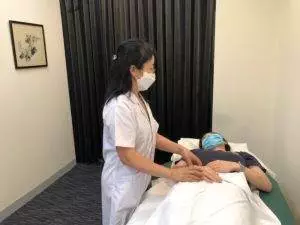
Miscarriage is the spontaneous loss of pregnancy. While it is not talked about much, it is very common; 10-20% of pregnancies end in early miscarriage. TCM and acupuncture methods, well-known for helping women with infertility issues, can be used successfully to prevent threatened miscarriage.
Sometimes called spontaneous abortion, miscarriage at 12 weeks or earlier is often due to chromosomal abnormalities in the developing fetus. In some cases, miscarriage or recurrent miscarriages are caused by the mother’s health condition.
While miscarriage is common, and very early miscarriage, sometimes called chemical pregnancy, may even go unnoticed, women who have experienced this should seek out care. The spontaneous ending of pregnancy is emotionally difficult no matter the circumstances, and hormone imbalances can cause other problems if left unaddressed. Acupuncture treatment and TCM herbal supplements can help support a full recovery and lay a healthy foundation for getting pregnant after miscarriage.
Signs and Symptoms of Miscarriage
While some bleeding in the first trimester is common (about 20% of women experience this), it can be an indication that the pregnancy is at risk.
Other signs of miscarriage include:
- Vaginal bleeding that is brownish or bright red
- Discharge that include clots
- Cramping or pain in the abdomen or lower back area, similar to menstrual cramps
- Contractions in the uterus that occur every 5-20 minutes, similar to labor pains
- Decrease in other early pregnancy symptoms, such as nausea and breast tenderness
In some cases, a miscarriage occurs without any signs of cramping or bleeding at all. Sometimes referred to as a missed miscarriage, missed abortion, or silent miscarriage, in this situation, a woman may not discover that she has miscarried until a doctor finds that there is no fetal heartbeat and checks via ultrasound and/or testing for HCG (pregnancy hormone) levels.
What Causes Miscarriage?
A positive pregnancy test usually can’t confirm a pregnancy until the third or fourth week, once implantation has occurred. It is estimated that miscarriage at 4 weeks or earlier, or when a fertilized egg has not successfully implanted, happens in up to 70% of conceptions. Miscarriage at 6 weeks or later is much less common; only about 5% of pregnancies end once this time when the heartbeat can be detected has passed.
Maternal age is one risk factor (20% of women over 35 might miscarry, while as many as 80% of pregnant women over 45 might miscarry). Chromosomal abnormalities in an embryo are more likely when a woman is older. The other most common reasons for a miscarriage to occur include:
- Hormonal imbalances – due to PCOS, low progesterone, diabetes, thyroid condition, etc.
- Thin or nutrient-poor endometrial lining
- Autoimmune issues
- Structural issues of the cervix or uterus, polyps, fibroid
- Exposure to toxins
- Smoking, alcohol, use of drugs
One of the primary reasons that a woman might miscarry during the second trimester is cervical insufficiency. In this case, there may be no prior symptoms, but the miscarriage begins with pressure or the water breaking. Once this weakness of the cervix has been discovered, doctors can treat this condition and protect subsequent pregnancies by making a “circling” stitch in the cervix at around the 12th week.
Recovering from a Miscarriage
The extent to which a woman may need medical intervention during miscarriage varies, depending on how advanced the pregnancy. If the pregnancy was still in the very early stages, and there is heavy bleeding, then the uterus may empty itself. However, if things have progressed further into the first trimester, and miscarriage at 12 weeks or thereabouts occurs, a woman may need medical attention to help expel all of the tissues from the uterus. This may be accomplished with medication (misoprostol, sometimes combined with mifepristone), taken orally or as a suppository, which will cause more cramping and the expulsion of the fetal and placental tissues. In other cases, it may be necessary for a doctor to perform a D & C (dilation and curettage), in which the tissues are surgically removed from the uterus.
Conventional medical treatment for miscarriage unfortunately does not offer much in the way of healing. The hormonal and emotional effects of a miscarriage can be profoundly upsetting. Feelings of grief, disappointment, and loss are very real, and if unresolved, can affect a woman’s mental and physical health going forward. Your acupuncture practitioner can provide holistic alternative care to help you recover from miscarriage. A program of acupuncture treatments, herbs, and caring support will focus on reestablishing a good flow of Qi and blood to the reproductive system while alleviating stress and anxiety. Balancing the hormones and emotions allows for the menstrual cycle to return to normal, and strengthens the organ systems so that subsequent pregnancy will start from a place of peak heath.
Can Acupuncture Help Prevent Miscarriage?
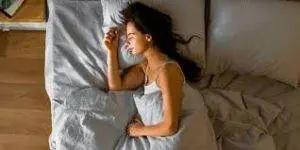
According to TCM theory, the vital energies–Jing (or essence), Qi (life force energy), Yin (female/cool energy) and Yang (male/warm energy)–must be balanced for optimal health, and this is especially true when a woman is preparing to bring a new life into the world. The quality of eggs and sperm depend on it. Naturally, as a woman ages, there will be some depletion of these energies, and this can be exacerbated by lifestyle habits: stress, overwork, diet, lack of sleep, etc.
Overall, TCM recognizes 4 differentiations of conditions that can lead to miscarriage:
- Kidney deficiency – Women with this type of deficiency may have experienced a late menarche (delayed first period), irregular cycles, anovulatory cycles (don’t always ovulate), long cycles. A woman might have been born with a kidney deficiency or it can develop due to exhaustion, heavy labor, or excessive sexual behaviors.
- Blood or Qi deficiency – This condition is related to the digestive system, when the stomach and/or spleen are not bringing enough nutrients to support and nourish the embryo.
- Excess Heat – If internal fire is too strong, it causes bleeding. This can cause the placenta to become detached and uterine contractions to begin, causing miscarriage.
- Injury – a fall or accident or excessive sexual activity during pregnancy can irritate the uterus, causing contractions.
Other causes could include: medications, antibiotics, food poisoning, or exposure to environmental toxins. Based on the presenting symptoms, an acupuncturist will determine which differentiation and create a treatment plan to address root causes. We can help to prevent miscarriage when there is spotting or cramping by calming the uterus to stop contractions and bleeding. Bed rest may be recommended, involving no exercise, no sexual activity, and no heavy labor.
The most effective preventive treatment happens pre-pregnancy. If a woman has one or two miscarriages or even three or more (habitual miscarriage), it is important that we take action to prevent problems before conception. Three months of treatment will prepare the body well to insure a full-term pregnancy. Ideally, a woman who is ready to get pregnant would seek acupuncture treatment and herbs to help strengthen all aspects of the reproductive systems for at least a few cycles before conceiving.
Acupuncture treatment can help prevent miscarriage by:
- Balancing hormones
- Treating PCOS
- Improving the quality of endometrial lining
- Calming contractions early in the pregnancy
- Improving blood flow and preventing clotting
- Regulating immune responses
- Reducing stress and anxiety
Top 5 Tips to Prevent Miscarriage

Self care is always important, but during pregnancy, it is especially vital to prioritize your health and wellness. The need to eat and rest appropriately cannot be overemphasized during this crucial time.
- Eat cooling foods – During pregnancy, women carry more heat in the body and often feel hot. It is best not to have anything too spicy; spicy food can encourage bleeding and trigger contractions. Cooling foods include: cucumbers, melons, citrus fruits, celery, leafy greens, soy and mung beans, eggs, millet, buckwheat, whole wheat.
- Avoid warming foods – Warming foods raise yang energy and body temperature. Be moderated from: deep fried food, coconut, leeks, onions, roasted walnuts, pistachios and pine nuts, and spices like cinnamon, cloves, pepper, ginger, garlic, mustard, chili pepper, or add more cooling food if there is warming food.
- Stay away from alcohol and coffee. Try chrysanthemum tea or peppermint tea as an alternative.
- Make sure you are getting the right balance of calcium and magnesium. Most people get more calcium than magnesium. Foods high in magnesium include spinach, beans, brown rice, and fish like halibut and salmon.
- If you experience bleeding or cramping, cease all activities, including manual labor, exercise and sex.
Acupuncture Near Me for Miscarriage Prevention
At Art of Wellness, our doctors have over 30 years of expertise in women’s healthcare through TCM and acupuncture. We specialize in helping women fulfill their dream of a healthy, full-term pregnancy from infertility treatment, to miscarriage prevention and complete pregnancy care. If you or someone you love is concerned about threatened miscarriage, please contact us to arrange an initial consultation and get started with a treatment plan right away.
We recommend that any woman who is seeking to start a family should begin partnering with her TCM practitioner before conceiving–ideally, for three months or menstrual cycles. This allows for any underlying health issues that may affect things to be addressed and gives the best chance for a full-term, healthy pregnancy.
*This article is for education from the perspective of Traditional Chinese Medicine only. The education provided by this article is not approved by FDA to diagnose, prevent, treat and cure human diseases. It should not stop you from consulting with your physician for your medical conditions. Traditional Chinese Medicine is based on Qi, which is an invisible force that usually cannot be observed by modern science. Because science focuses on testing ideas about the natural world with evidence obtained through observation, these aspects of acupuncture can’t be studied by science. Therefore acupuncture and Chinese herbs are often not supported by double-blind, randomized trials, and they are considered alternative medicine therapies in the United States.
Happy New Year 2020 – Year of the Rat

Qineng Tan L.Ac., Ph.D.
Gong Xi Fa Cai! We wish you congratulations and prosperity in the New Year!
The Chinese Zodiac, like the Western Zodiac, is comprised of twelve signs, characters signified by animals. Like all of the Taoist arts, Chinese Astrology operates on both the microcosmic and macrocosmic levels. The twelve signs are used to divine information about the personalities of people born under those signs, and also to give meaning and context to the events that occur globally over the course of that year. Check here to find the sign of your birth year.
In the year 2020, we greet the Rat. The Rat is the first of the twelve signs. This means we are beginning a new cycle. According to legend, the Jade Emperor set a challenge to create the order of the signs – they would be arranged according to their arrival to his celebration feast. The Rat and the Cat hopped lightly up onto the Ox’s back, unbeknownst to her, and hitched a ride. As they were crossing a river, though, Rat bumped Cat off into the water. (Accidentally or intentionally? At any rate, this story explains why Cats chase Rats, and why there is no Cat in the Zodiac.) When the Ox was about to cross the finish line, Rat jumped down and landed before the Emperor first!
So, the Rat is a bit tricky and opportunistic, but also quite clever and resourceful. Being first in the cycle, he represents the dawning of a new day, with plenty of Yang energy. Rats’ ability to multiply in numbers makes them a potent symbol of fertility and abundance.
Each circle of twelve years also brings through a new cycling of the elemental energies that develops over the course of a 60-year calendar. Rat of 2020 is Metal. Metal rat is relatively grounded and stable. On the surface, he is always positive and sure of himself, but in secret, he worries that he is not always in the right.
Rat’s optimism and dynamic personality make him popular, even though his way of expressing himself might seem a bit brash or even downright rude. Rats know how to make the best out of a bad situation. They like to hoard rather than spend. This can be thrifty, but might also lead to hanging on to things that aren’t essential.
Rats tend to run around in a burst of energy and then get tired and sick. They also tend to get busy and forget to eat, and then eat too much of the wrong things. So, let’s all remind ourselves to pause frequently for rest and nourishment, setting ourselves up to do well when it’s go time.
From our Art of Wellness family to yours, we wish you good health and all the very best that the New Year has to offer! Read more about our favorite New Year traditions here. And for advice on making the most of your resolutions, read more here.
Feng Shui for the Chinese New Year

Feng Shui is the ancient art and science of creating harmonious living and working spaces. It is part of the Taoist traditions that also include Traditional Chinese Medicine and modalities like Qi Gong and Tai Qi. Like these other practices, Feng Shui is a way of purposefully directing energy – “Qi – to create a beneficial outcome. People often consult a professional when they are moving into a new house or work space, or trying to create more growth in some area of their lives. When it comes to greeting the new year with hope and purpose, Feng Shui a great way to align actions with intentions.
In the context of Feng Shui, every space has a map. This map indicates the difference areas of energy within it that correspond to other aspects of life, and can be used by the people who inhabit it as a guide for which direction to take.
Harness your best energy in the new year by first deciding on your focus: increasing your financial wealth, improving your physical and mental health, or improving your relationships with others. To find the directions within your home or office space, use a digital compass. Then, find your Gua number, based on the year of your birth. Finally, find your number in the Eight Mansions chart to show you which way to direct your energies so that they find the most fertile ground.
To bring positive energy flowing towards your health, wealth and love, turn your bed so that your head is pointed towards the right direction while you sleep. Turn your desk that way, too, and if you are meeting new clients or love interests, be sure to face your key direction as you shake hands. Any place in your home that you spend a lot time, arrange yourself to be facing your goal orientation.You may begin to feel results right away, but be patient. It can take up to three months for the changes to be fully felt.
Chinese New Year Recipe – Lucky Stir-Fry
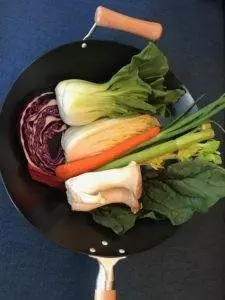
Many traditional recipes populate menus for the New Year celebration, but the important thing is to serve and eat foods that signify some type of luck to be sought and welcomed in the upcoming year. It’s possible to create a beautiful and meaningful dish that’s entirely plant-based, too. The Chinese word for “abundance” – “shi” – also means the number “10,” so some people like to serve a dish with ten different types of vegetables. But add as many you find appealing and keep things simple with a stir-fry. Start with a little bit of cooking oil, then add one or two aromatics, such as scallion, garlic, ginger, chilies. Once it’s hot, add your harder, crunchier vegetables first, then in another minute, toss in the softer, leafier ones. Add a little water to create some steam, then finish with a drizzle of sesame oil and soy sauce.
Symbolism of Vegetables
cilantro – compassion
bean sprouts – abundance
napa cabbage – prosperity
bamboo shoots – a fresh start
cashews – gold, money
Coconut – togetherness
Mushroom – longevity
Peanut – stability and growth
Pumpkin – success for one’s children
Sticky rice – the family staying together
Snowpeas – unity
Everything about your veggie stir-fry signifies freshness, and eating it certainly bodes well for your future health.
“Fú shòu shuāng quán.” “May you enjoy both longevity and blessing.”
What is Multiple Sclerosis and How to Manage MS with TCM & Acupuncture
Multiples Sclerosis is autoimmune disease, Traditional Chinese Medicine & Acupuncture are very helpful to improve these condition.
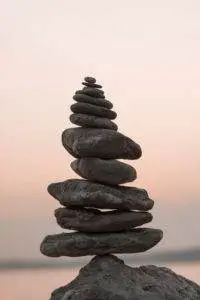
Dr.Tan’s Case and Testimony
Mr. M- a healthy 50-year old Caucasian gentleman—first visited my office Art of Wellness Acupuncture a few years ago. As an attorney, he had been working very hard to support his two daughters, who were both in college. About four months ago, the onset of serve lower back pain along with tingling in his left leg changed his life completely. He saw several doctors, had a number of x-rays and an MRI which revealed a moderate bulging disk on L4-L5. He tried different pain pills, NSAIDs, and underwent three months of physical therapy, none of which had helped. Recently, he had been experiencing numbness and weakness in his left leg, and was suffering from depression due to his inability to carry on with daily work and regular activities. When he talked to me, I noticed that he constantly rubbed his eyes. I asked if he felt any abnormalities in his vision. He answered yes, and that he had periodic occurrences of blurred vision. When I suggested that he showed me how he walks, I noticed his poor balance. He tended to fall on his left side because his left leg did not seem to follow his motion. Then I checked his knee and ankle reflex and found that they were excessively active. I was almost certain that the condition that made him suffer so much in the last few months was not a simple bulging disk or sciatica; it was a disorder of the central nervous system-Multiple Sclerosis. Immediately, referred him to a neurologist and suggested that he have a brain and cervical MRI. Two weeks later, he came back to my office with a confirmed diagnosis of Multiple Sclerosis.
Mr. M. is just one of 200 patients who are diagnosed with MS every week in the United States. There are about 400,000 people in the U.S. and 2.5 million patients who are suffering from this disease in the world.
Cause of MS
MS is an autoimmune disease in which infections or environmental changes can confuse the body’s defense system. Sometimes a foreign antigen mimics a group of the body’s own proteins. When the immune system response by mounting an attack against these foreign invaders, it inadvertently destroys the foreign antigen along with any similar antigens, including the body’s own tissues.
A recent study shows that a virus called adenovirus type 2 looks remarkably similar to the composition of the protective covering around the spinal cord and parts of the brain—the myelin sheath cells. The attacks of the immune system of this virus along with the mistaken attack on the myelin sheath is believed to be the ultimate cause of multiple sclerosis。
Common symptoms of MS
- numbness or tingling, usually in the leg or arm
- muscle weakness
- dizziness
- spasticity
- pain (moderate to severe)
- Ataxia
- Tremor
- Slurred speech
- Blurry, double vision or blindness
- bladder malfunction
- bowel dysfunction
- sexual dysfunction
- depression
- euphoria
- cognitive abnormalities
- fatigue
Most commonly, MS first manifests itself in a series of attacks followed by complete or partial remission as symptoms mysteriously lessen. These symptoms, however, will return later after a period of stability. This is called relapsing-remitting (RR) MS.
Treatment of MS
Unfortunately, there is no cure for MS yet. In Western Medicine, the treatment focuses mainly on decreasing the rate and severity of relapse. Beta interferons, anti-cancer drugs (to weaken the immune system), and steroids are commonly used for the treatment of MS. These medicines can reduce the number of MS lesions, delay the progression of the disease, and provide symptomatic relief for the patient.
In TCM, a condition called “Wei Syndrome” with symptoms similar to MS, was documented 2000 years ago in a classic Traditional Chinese Medicine book called Emperor Classic Medicine. Acupuncture and Traditional Chinese Medicine has been involved in the treatment ever since. MS patients who have tried acupuncture report improvement in pain, spasticity, numbness and tingling, fatigue, depression, anxiety, and bowl, bladder function.
Maintaining a healthy lifestyle is very important for the MS patient. This includes:
- Getting enough time to sleep and rest. Go to bed early
- Exercise regularly. Tai Chi and Yoga are very good to help patient relax, balance and with muscle strength
- Balanced diet, a lot of vegetables and enough protein from white meat
- Stress management
- Daily meditation and positive thinking
- Staying connected with friends and joining a support group
- How to reduce and prevent inflammation
Patient Story- Gilly
I was diagnosed with Relapsing Remitting MS in 1991 and I had no idea what a crazy, unpredictable journey I was about to embark on.
I woke up one morning, tried to get out of bed but my legs were like jello, I had no balance and had double vision.
I was given a spinal tap and MRI and lesions were detected on my brain & cervical spine.
When first diagnosed, my neurologist put me on one of the few FDA approved medicines for MS which don’t cure the disease, but delay the progression. For that I inject myself daily and have done so for 17 years
For the first 7 years after being diagnosed, I experienced relapses (flare up of symptoms) on average twice a year. The treatment for relapses was a 5 day course of steroids administered through IV, followed by 12 days of oral steroids.
The relapses affected my motor skills the most, especially walking but after a treatment of steroids, I was almost as good as new.
My friends suggested I try acupuncture. I was recommended to Dr Tan because he had studied MS in China. *
Dr Tan has been monumental in my life. He has given me treatments for a multitude of injuries I’ve suffered over the years due to frequent falls and is an expert in pain relief. He treats me for stress relief which contributes my general wellbeing. Dr Tan is very knowledgeable about Western medicine and MS treatments so I always ask his opinion.
I’ve been diagnosed with MS for 21 years and feel fortunate that Dr Tan has been treating me for a large part of that time. Although I partake in Western medicine, I know that Western medicine only treats the symptoms but Eastern medicine treats the cause of the symptoms.
My MS has progressed to the stage that I now use a wheelchair full time.
I go to acupuncture for preventative care. My immune system needs extra help especially during cold & flu season.
I am very aware that MS is a ‘designer’ disease, and no two people have the exact same symptoms. I would encourage anyone with MS to avoid stress, keep up a healthy immune system and try to stay positive and happy, because your emotional state affects your physical being.
